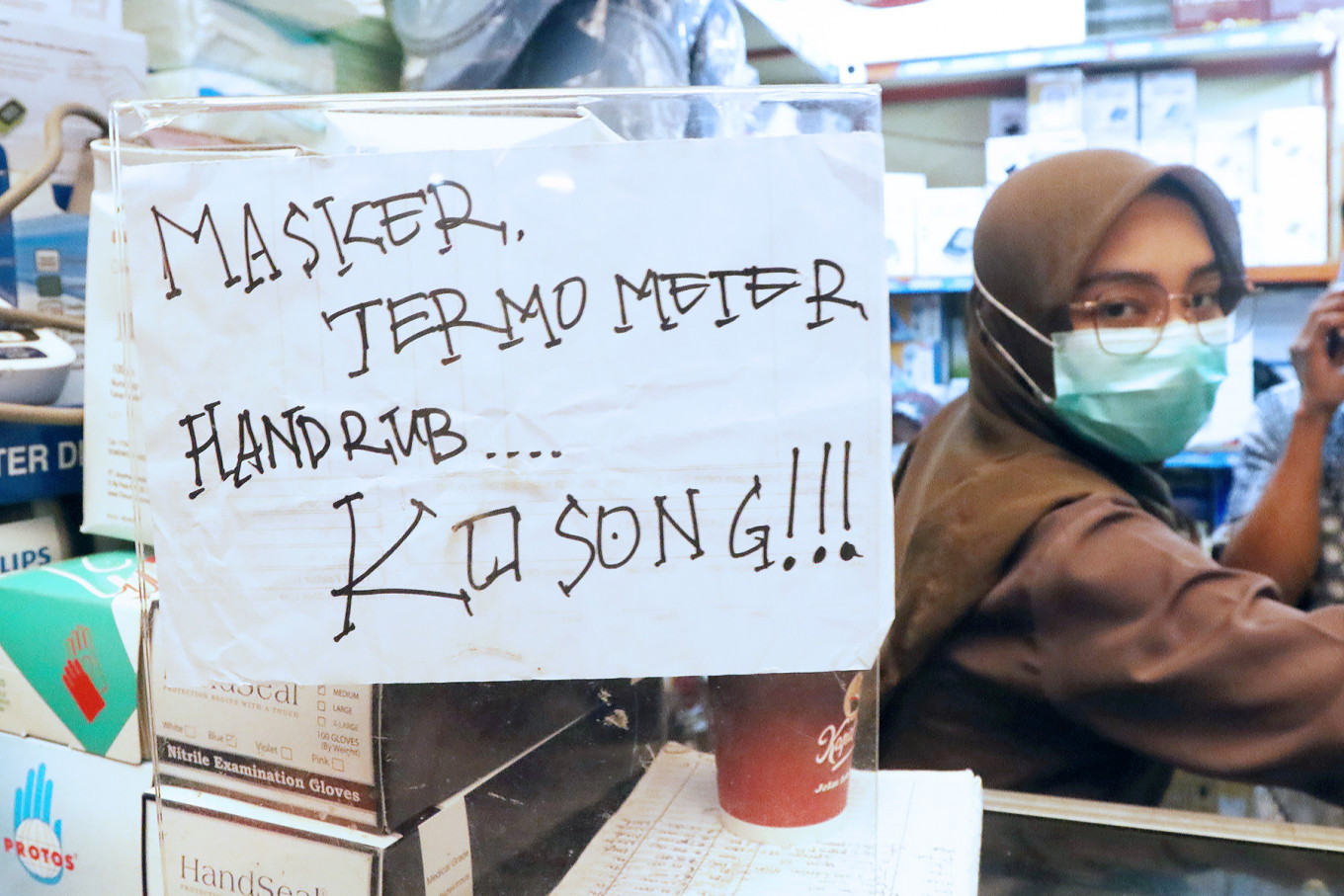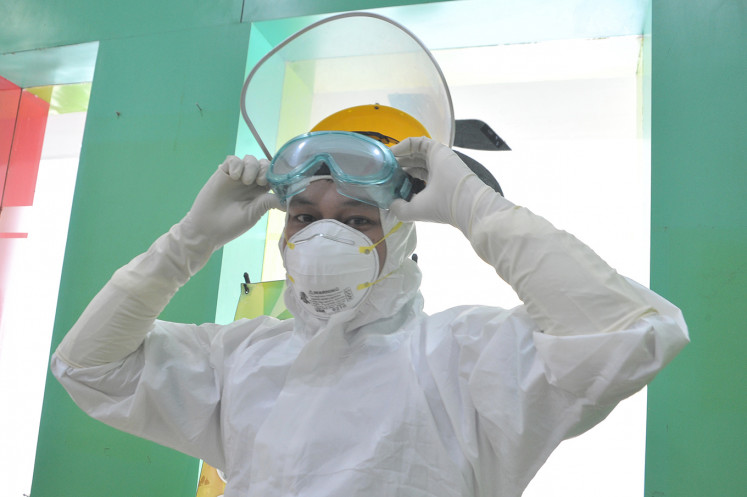COVID-19: Inadequate medical supplies take toll on lives of Indonesian medical workers
A hospital crisis looms as reports indicate that the combined capacity of the 132 referral hospitals designated to treat COVID-19 patients is far from adequate. Protective gear for medical workers is in short supply in both referral and regular hospitals across the country.
Change Size
 A drugstore displays a sign of face masks and hand sanitizers shortage at Pramuka market in East Jakarta on March 4. (JP/Dhoni Setiawan)
A drugstore displays a sign of face masks and hand sanitizers shortage at Pramuka market in East Jakarta on March 4. (JP/Dhoni Setiawan)
T
he COVID-19 coronavirus has put a massive strain on Indonesia’s healthcare system, with reports of inadequate medical supplies and the deaths of hospital workers as patient numbers continue to surge.
An ear, nose and throat (ENT) specialist from Bekasi, West Java, died on Saturday at Persahabatan Hospital in East Jakarta. Another doctor, a 34-year-old neurologist, died at the same hospital in the early hours of Sunday.
A 70-year-old surgeon from Bogor, West Java, died at Gatot Subroto Army Hospital (RSPAD) in Central Jakarta on Saturday.
Persahabatan Hospital spokesperson Erlina Burhan confirmed two of the three deaths. “It is true [that the ENT doctor and the surgeon died on Saturday]. The surgeon was not treated here but at RSPAD,” she told The Jakarta Post.
Erlina could not confirm the case of the 34-year-old neurologist, but Indonesian Medical Association (IDI) chairman Daeng Muhammad Faqih confirmed the deaths of all three doctors.
Read also: Jokowi calls for focus on healthcare, safety net as economists push for flexible budget
Pandu Riono, a public health expert at the University of Indonesia and a relative of the 70-year-old surgeon, told the Post that the surgeon felt sick and showed symptoms of fever, coughing and shortness of breath on Wednesday night. He was immediately sent to a local hospital and hooked up to a ventilator.
“On Thursday, the doctor who treated him said he was a suspected COVID-19 patient and the Bogor Health Agency sent his throat swab sample to the Health Research and Development Agency [Balitbangkes],” Pandu said.
“His doctor tried to transfer him to RSPAD and the Sulianti Saroso Infectious Diseases Hospital, but both hospitals were filled to capacity," he said. "RSPAD took him in on Saturday morning, but his condition had drastically deteriorated."
Pandu said he had yet to receive results from the Balitbangkes. However, a doctor at Gatot Subroto Army Hospital told the family that the surgeon had tested positive for COVID-19.
A hospital crisis looms as reports indicate that the combined capacity of the 132 referral hospitals designated to treat COVID-19 patients is far from adequate. Protective gear for medical workers is in short supply in both referral and regular hospitals across the country.
While the system is inadequate, the government still maintains a lack of transparency over releasing information about patients and its preparedness, a policy that it has maintained since the emergence of the pandemic in January. This often leaves medical workers in the dark about whether they are treating a COVID-19 patient and it puts their lives at risk.
Read also: If not us, who else will do it?': Sweat and tears of Indonesia's COVID-19 nurses, doctors
Of the country’s 514 confirmed COVID-19 cases and 48 fatalities reported as of Sunday evening, it remains unclear how many were medical staff members who worked on the front lines.
“We are still compiling the data. We have yet to know for sure because many of the COVID-19-positive patients were immediately admitted to hospitals without having first provided information regarding their occupations,” Achmad Yurianto, the Health Ministry’s disease control and prevention director general, told the Post over the phone on Sunday, still declining to reveal details of cases.
The frustration of medical workers is emerging in many provinces as medical supplies become depleted.
Adam Malik Hospital in Medan, North Sumatra, has experienced difficulties meeting the needs for medical coveralls, goggles and hand sanitizer by its staff members, according to hospital spokesperson Rosario Dorothy.
“We need 100 sets of protective health gear per day. Please help us – protective health gear is urgently needed for our medical teams that have been treating COVID-19 patients,” said Rosario, adding that the hospital had recorded a rise in the number of COVID-19 patients admitted to its wards.

The management of the Airlangga University General Hospital in Surabaya, East Java, reported that it had been essentially running on fumes as its remaining medical supplies would barely last for three days.
Nily Setyorini, the Airlangga spokesperson, said the hospital had quickly run out of face masks and coveralls because of the recent influx of COVID-19 patients. The hospital employs up to 200 health workers who directly treat coronavirus cases every day, according to Nily.
“So we need about 200 single-use coveralls per day,” Nily said, adding that staff members had no choice but to reuse face masks because of dwindling supplies, despite the health risks that come with it.
Nily said if the hospital’s need for coveralls remains unmet over the next few days, the management would have no choice but to distribute raincoats as makeshift coveralls to its staff.
University of Indonesia public health expert Hasbullah Thabrany urged the public to comply with the government’s social-distancing policy to flatten the so-called infection curve and, therefore, prevent the system from becoming overloaded.
“Frankly, I don’t think we are equipped enough as it is to deal with further escalation. There are only 1,200 lung specialists across the country who are proficient in examining respiratory illnesses caused by the virus. The mitigation should be viewed as a collective endeavor with active participation from the public,” he told the Post.
Yani Muchtar, a radiologist at Harapan Kita Hospital, urged the government to devise a system that enables seamless cooperation between hospitals should any of them fail to function because of short supplies of resources at the height of the public health crisis.
“It all depends on the system. We need to always be prepared for the worst-case scenario,” she said.
If the Indonesian authorities fail to take drastic measures to slow down the spread of COVID-19, the country could have tens of thousands of cases by April, shortly before the Idul Fitri holiday.
Disease surveillance and biostatistics researcher Iqbal Ridzi Fahdri Elyazar and his team at the Eijkman-Oxford Clinical Research Unit have used the geometric sequence method to determine “how much time it would take for the number of cases to double in Indonesia”.
Based on their calculations, Indonesia could be grappling with up to 71,000 COVID-19 cases by the end of April.
Read also: Some 70,000 Indonesians could be infected with COVID-19 before Ramadan, scientists say
The Public Works and Housing Ministry is rushing to convert four apartment towers of Wisma Atlet Kemayoran, an athletes village in Central Jakarta, into a hospital to treat as many as 22,000 COVID-19 patients.
Public Works and Housing Minister Basuki Hadimoeljono said on Sunday that construction work on the apartments has been completed and that the COVID-19 hospital would be operational by Monday.
"One hundred percent [of the work] has been completed; all that's left is the installation of equipment, which will be organized this afternoon," Basuki said. "Tonight is the dress rehearsal; tomorrow we will start operations." (trn/aly/mfp)









